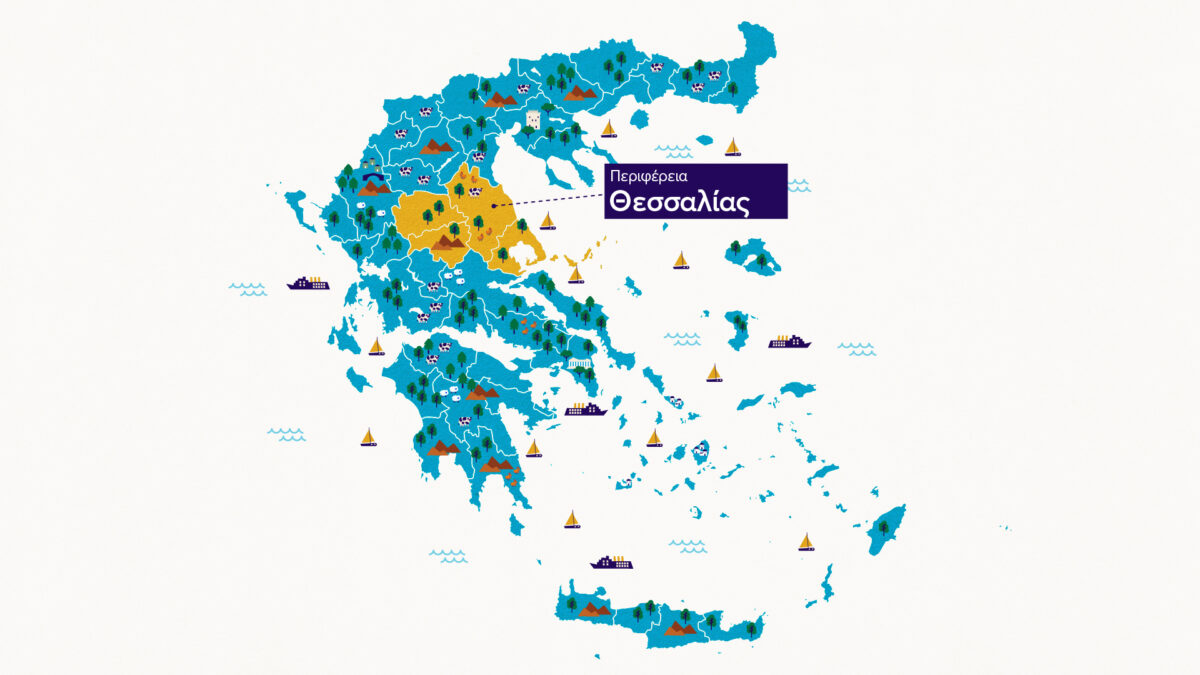The Region of Thessaly encompasses the Larissa, Karditsa, Magnesia and Trikala Regional Units, with its capital in the city of Larissa. Geographically, the region sits between Central Greece, Epirus and Central Macedonia on the Greek mainland, but it also includes the Northern Sporades island group, which consists of Skiathos, Skyros and Alonissos. Mount Olympus, Greece’s highest mountain, marks its northern extremity, straddling the borders of Pieria and Larissa and separating the region from Central Macedonia.
Thessaly boasts a rich history stretching back to antiquity. In ancient times, it was a vital area for the Hellenic world, with numerous connections with the Olympian gods and the legends of the Mythical Heroes. During the classical period, the region actively participated in the Persian and Peloponnesian Wars. Later on, during the Roman period, it was ruled by the Eastern Romans, experiencing stark changes over the centuries. The periods of Macedonian, Roman, Byzantine and Ottoman rule left their indelible mark on the local culture, architecture and art.
The Region of Thessaly is one of Greece’s most popular tourist destinations, featuring a unique blend of natural beauty, culture, and traditional heritage.
Visitors to the region have a wide variety of potential locations to visit. The monasteries at Meteora, recognised as a UNESCO World Heritage site, are one of Greece’s most prominent and impressive monuments. Pelion is sure to enchant with its striking natural beauty and picturesque traditional villages. The Karditsa area has numerous locales for visitors to explore, such as Lake Smokovo or Lake Plastiras, while the Northern Sporades archipelago and the region’s Aegean beaches are ideal summer destinations.
Thessaly has a wealth of flora to exhibit, with its dense vegetation and verdant forests: the Olympus National Park, the Ossa Forest Complex, the Tempi Aesthetic Forest and the Mount Othrys National Park all present themselves as prime places for exploration, adventure and leisure. In fact, thanks to this abundance of natural wealth, the local mountains have become hubs for ecotourism in recent years.
The rich fertile farmland of Thessaly, with its wide-open plains, is Greece’s most productive agricultural land. It is considered the country’s “productive heartland”, with extensive cultivation of cotton, grain, vegetables and fruits.
Thanks to the local livestock breeding activity, the region has a plethora of dairy products to offer, with cheeses such as feta, graviera, kefalotyri and kaseri, in addition to other dairy products produced with cow’s or goat and sheep’s milk. Another product of the region’s livestock farming is is cured and smoked meats, with an enormous variety of sausages. Also produced here are trahanas and pasta, from locally sourced raw materials.
Thessaly has a rich and authentic cuisine based on the region’s home-grown products. Local dishes heavily feature meat, cheeses, olive oil, herbs and vegetables.
Concurrently, thanks to its coastlines, the region also produces choice catches, including fish and shellfish. The city of Volos is known for its mezedes served with tsipouro and has a long tradition in salt-cured fish, which accompany every meal.
Pies occupy a special place in Thessalian cuisine. In addition to the various classic pies or the “striftes” rolled pies made in the Sporades, there are two traditional local pies rooted in rural cuisine: plastos and batzina. They are simple recipes, made with basic ingredients such as eggs, flour, cheese, greens and aromatic herbs. Savoury pies made with batter instead of phyllo dough reflect the purity of Greek cuisine. Naturally, Thessalian cuisine also has sweet pies to offer, such as galatopita and sweet pumpkin pie.
Thessaly is also home to distilleries that produce excellent tsipouro, a spirit known for its rich body and aroma and intricately connected with Greek culture and hospitality. Often served with mezedes, it is never absent from social gatherings and celebrations.
To conclude, the Region of Thessaly boasts a rich history associated with Greek mythology and historical events, not to mention an extensive cultural heritage. Beyond its one-of-a-kind nature, the region also features picturesque cities such as Trikala and Volos, and visitors are sure to be enchanted by its timeless traditions and local flavours.










